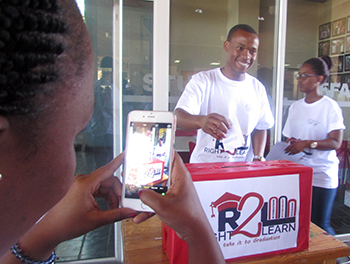Latest News Archive
Please select Category, Year, and then Month to display items
13 August 2024
|
Story Anthony Mthembu
|
Photo Sibahle Dayimani and Amandla Kulu
 Prof Peter Roseel, Managing Director of Management Consulting and Research – a spin-off of the Catholic University of Leuven in Belgium; and Prof Nicolene Barkhuizen, Director of the UFS Business School.
Prof Peter Roseel, Managing Director of Management Consulting and Research – a spin-off of the Catholic University of Leuven in Belgium; and Prof Nicolene Barkhuizen, Director of the UFS Business School.
The Business School at the University of the Free State (UFS) hosted Prof Peter Rosseel, Managing Director of Management Consulting and Research – a spin-off of the Catholic University of Leuven in Belgium – for a guest lecture during his visit to the UFS Faculty of Economic and Management Sciences (EMS).
The guest lecture took place on 19 July 2024 in the Business School Auditorium and was attended by academics from the UFS.
Reflecting on the lecture
The lecture presented by Prof Rosseel focused on how combining strategy, strategy implementation, culture transformation, leadership, and learning successfully leads to sustainable growth, creates engagement, and delivers tangible results. Throughout the lecture, Prof Rosseel spoke about how experts tend to make bad leaders and therefore stop change from happening within an organisation. In fact, he highlighted that, “Experts stop change from happening within the workplace because experts, by definition, look through the eyes of their expertise, but you cannot reduce the world to different forms of expertise, as it is holistic.” As such, he argued that to change an organisation, one must see things from the point of view of others.
Furthermore, Prof Rosseel delved deeper into the hierarchical operating model within organisations. He indicated that the above model should be one community within organisations; however, unfortunately it is not. This is because organisations are made up of several departments such as finance and human resources. As such, he regards these departments to be silos that could prove to be detrimental to organisations, as each silo can create its own culture as opposed to an organisational culture. These are some of the points he discussed throughout the lecture.
After the lecture concluded, the audience had the opportunity to engage with Prof Rosseel on his viewpoints. In fact, Lyle Markham, Academic Head of Department and Lecturer in Industrial Psychology at the UFS, was one of the audience members and described the lecture as insightful.
Right to Learn campaign seeks to fund financially needy students
2015-11-11
 SRC President, Lindokuhle Ntuli, pledges financial support to the Right to Learn campaign.
Photo: Tango Twasa |
In response to the dire need for financial relief for academically deserving students from underprivileged backgrounds, the Student Representative Council (SRC) of the University of the Free State (UFS) launched the Right to Learn campaign on Friday 30 October 2015. The campaign, which aims to counter deregistration, was initiated following the national #FeesMustFall campaign, which gained momentum after students from the University of Witwatersrand first mobilised against the proposed fee increases for 2016.
The SRC’s Projects Committee realised that, although President Jacob Zuma had consented to a 0% increment, the lack of an increase would not eliminate the financial burden currently facing some students.
“The campaign was conceived at the SRC’s strategic planning meeting, and is now spearheaded by the SRCs Projects Committee,” said Letsika Leqoalane, SRC: Academic Affairs. “The campaign was founded on the university's value of ‘Superior Scholarship’ and the SRC’s value of reducing student financial exclusions,” he added.
Students in pursuit of continued access to education
The Right to Learn campaign was established as a supplementary initiative to the #FeesMustFall movement. “The Right to Learn campaign is an initiative to raise funds for students who are facing financial exclusion in the coming year,” said the SRC Academics Affairs officer.
All proceeds will be channeled towards reducing the number of students who will face de-registration in 2016, the SRC textbook bursary, and food bursaries. “This campaign stands on three pillars, namely: no to de-registration, no to student food insecurity, and yes to textbooks,” explained Leqoalane.
A call for support
According to SRC President, Lindokuhle Ntuli, “SRC members have made pledges of no less than R500 each from their own pockets.” The SRC is appealing to the UFS community to make donations into the campaign bank account, and thereafter to email the proof of payment to Ntuli at NtuliL@ufs.ac.za. The account details are:
Account number: 15-7085-0721 ABSA Bank Branch
Reference: SRC FUND
Branch Code: 632005 Cheque Account
Swift code: ABSAZAJJ